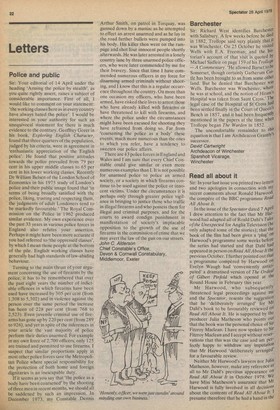Letters
Police and public
Sir: Your editorial of 14 April under the heading 'Arming the police by stealth', as you quite rightly assert, raises a subject of considerable importance. First of all, I would like to comment on your statement: `the working classes here as in every country have always hated the police'. I would be interested in your authority for such an unequivocal statement for there is much evidence to the contrary. Geoffrey Gorer in his book, Exploring English Character, found that three quarters of the population, judged by his criteria, were in agreement in 'enthusiastic appreciation of the English police'. He found that positive attitudes towards the police prevailed from 79 per cent in his upper middle classes to 65 per cent in his lower working classes. Recently Dr William Belsen of the London School of Economics in his 1975 study of London's police and their public image found that 'in terms of being broadly satisfied with the police, liking, trusting and respecting them, the judgments of adult Londoners tend to be markedly favourable.' The Royal Commission on the Police in 1962 produced similar evidence. My own experience over the past 33 years in various police forces in England also refutes your assertion. Perhaps it might have been more accurate if you had referred to `the oppressed classes', by which I mean those people at the bottom of the pile. English working classes have generally had high standards of law-abiding behaviour.
Turning to the main thrust of your argument concerning the use of firearms by the police, it has to be remembered that over the past eight years the number of indictable offences in which firearms have been used have increased by 305 per cent (from 1,308 to 5,302) and in violence against the person over the same period the increase has been of 228 per cent (from 768 to 2,523). Even juvenile criminal use of firearms has gone up by 220 per cent (from 289 to 926), and yet in spite of the inferences in your article the vast majority of police perform their duties unarmed. For example in my own force of 2,700 officers, only 125 are trained and permitted to use firearms. I suspect that similar proportions apply in most other police forces save the Metropolitan Police where special responsibility for the protection of both home and foreign dignitaries is an inescapable duty.
If it seems as you say that 'the police as a body have been coarsened' by the shooting of three men in recent months, we should all be saddened by such an impression. In December 1973, my Constable Dennis Arthur Smith, on patrol in Torquay, was gunned down by a maniac as he attempted to effect an arrest unarmed and as he lay in the road further bullets were pumped into his body. His killer then went on the rampage and shot four innocent people shortly afterwards. He was later arrested in a lonely country lane by three unarmed police officers, who were later commended by me for their bravery. Since that time I have commended numerous officers in my force for disarming armed criminals without shooting, and I know that this is a regular occurrence throughout the country. On more than one occasion my officers, who have been armed, have risked their lives to arrest those who have already killed with firearms or have threatened to kill with firearms, and where the police under the circumstances might have been excused for shooting they have refrained from doing so. Far from 'coarsening the police as a body' these events, much more numerous than the ones to which you refer, have a tendency to sweeten our police affairs.
There are 43 police forces in England and Wales and I am sure that every Chief Constable could give similar or even more numerous examples than I. It is not possible for unarmed police to police an armed society, or a society in which firearms continue to be used against the police or innocent victims. Under the circumstances it is perhaps only through greater police vigilance in bringing to justice those who traffic in illegal firearms and who possess them for illegal and criminal purposes, and for the courts to award condign punishment in manifestation of society's implacable opposition to the growth of the use of firearms in the commission of crime that we may avert the law of the gun on our streets. John C. Alderson Chief Constable's Office, Devon & Cornwall Constabulary, Middlemoor, Exeter
Barchester
Sir: Richard West identifies Barchester with Salisbury. A few weeks before he died in 1882, Trollope said very plainly that it was Winchester. On 25 October he visited Wells with E.A. Freeman; and the historian's account of that visit is quoted by Michael Sadleir on page 159 of his Trollope — A Commentary. 'He allowed Barset to be Somerset, though certainly Gatherum Castle has been brought to us from some other land. But he denied that Barchester was Wells. Barchester was Winchester, where he was at school, and the notion of Hiram 's Hospital was taken from Saint Cross.' The legal case of the Hospital of St Cross had been settled finally in the Court of Queen S Bench in 1857, and it had been frequendY mentioned in the papers at the time when Trollope began The Warden in 1852. The uncomfortable remainder to this equation is that I am Archdeacon Grandy s successor.
David Cartwright Archdeacon of Winchester Sparsholt Vicarage, Winchester






































 Previous page
Previous page